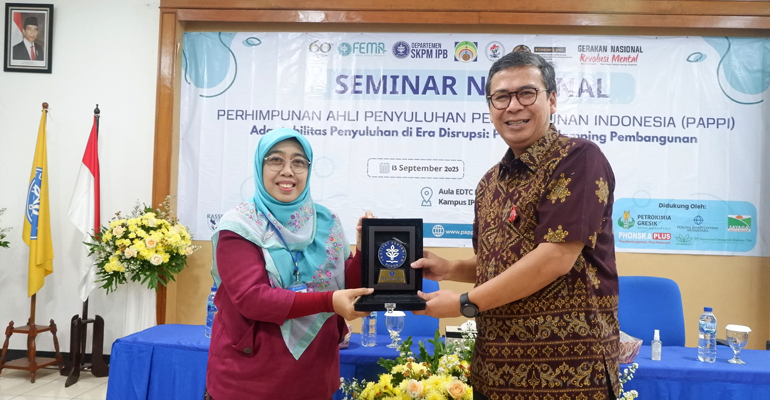IPB University Professor: Counselors Profession Have a Strategic Role in Development

The counselor profession has a strategic role in national development. This was conveyed by the Professor of IPB University, Prof R Nunung Nuryartono at the National Seminar of the Association of Indonesian Development Extension Experts (PAPPI) which was held at the IPB Baranangsiang Campus (13-15/9).
“Instructors have a strategic role in development. In fact, several development programs place instructors and assistants as the main key,” said Prof Nunung, who is also Vice for Coordination of Social Welfare Improvement, Coordinating Ministry for Human Development and Culture (PMK).
Development assistants, he said, must have expertise and certification, so they cannot be careless in the recruitment process. Prof Nunung explained that in the near future, the government will integrate instructors and assistants in ministries and institutions. “The government will coordinate so that there is coordination and synergy, so that regional development programs can be accelerated,” he said.
“Data in 2020 shows that there are 300,000 assistants in the country, consisting of agricultural, health, village assistants and family hope program assistants. If synergized, the impact will be extraordinary. “The development program can run optimally,” continued Prof Nunung.
PAPPI General Chairperson, Dr Siti Amanah said, there needs to be collaboration and synergy in making development programs a success through the strategic role of counseling as knowledge and a practical approach in transforming behavior in the era of disruption. “In this case, companions and support systems at all levels (macro policies and tactical programs at the local level) are very necessary,” she explained.
She added, one of the solutions that PAPPI can implement to increase competency is to hold competency certification through continuous education and training programs for extension workers, in collaboration with universities.
Apart from that, said Dr Siti, extension workers as part of development assistance must have the adaptability to remain relevant and effective in an era of disruption. Extension agents must be able to utilize information and communication technology as a tool to achieve extension goals more efficiently.
“In the future, the role of development assistants will become increasingly important. Development assistants work together with extension workers in accompanying and guiding communities in facing rapid changes,” said this IPB University lecturer from the Department of Communication and Community Development (SKPM), Faculty of Human Ecology (Fema).
This activity, which was held thanks to the collaboration of PAPPI, the Association of Indonesian Extension, Development Communication and Community Empowerment Study Programs (APP-KPPMI) and the SKPM Department of IPB University, was also supported by the Coordinating Ministry for Human Development and Culture (Kemenko PMK) of the Republic of Indonesia, Petrokimia Gresik, Pesona Khatulistiwa Nusantara, PT Saraswanti Anugerah Makmur Tbk, Perum Bulog, Sayaga Wisata Bogor, Aqua-Danone, Indofood, RASSEA, Indonesia Forum for Rural Advisory Services (IFRAS) and CARE IPB University. (SKPM/Rz) (IAAS/YMK)



